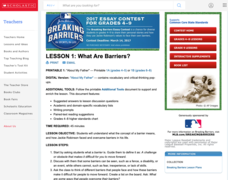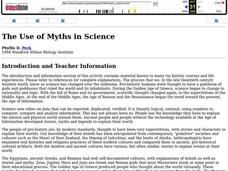Constitutional Rights Foundation
Refugees: International Law and U.S. Policy
Discover the ways America has opened its borders to international refugees, and the ways other countries have been more or less welcoming, with an informational passage about United States and international policies on refugees....
Scholastic
Lesson 1: What Are Barriers?
Scholars discuss the concept of a barrier with a short passage on Jackie Robinson. The writing process begins with a paragraph and several other sentences about Robinson's unique traits that made breaking a barrier...
Curated OER
100 Famous Quotes
Students explore famous quotes from throughout history. In this multicultural literacy lesson, students work as a team to read and memorize a list of 100 quotes. Students participate in a game in which the first half of a quote is...
EduGAINs
Migration—Push and Pull Factors
What causes people to move from one place, one city, or one country to another? Using the provided migration questionnaire, learners interview family members about the factors that cause them to be pushed from an area or pulled to...
Curated OER
It Has Been Rubbish For Years
Students are presented with the problems of percentages and focus upon numbers in contrast to 100. They calculate problems with money and are engaged with the use of games as a teaching tool. Students also interpret data as presented in...
Curated OER
Men of Steel
Students explore early 20th century steel making. In this U.S. history steel making lesson, students view and describe a postcard and a picture depicting exaggerated aspects of the steel industry. Students listen to a poem...
Syracuse University
American Industrial Revolution
While the Industrial Revolution may have fueled America's rise to the top of world markets, the child laborers often faced dangerous conditions. Using primary source images and other information, scholars consider what these children...
Curated OER
Lesson: Allison Smith: What Are You Fighting For?
Trench art is a nontraditional art form created by soldiers in trenches during wartime. Artist Allison Smith connects her art to the American Revolution and the question: "What are you fighting for?" Kids examine her art, how it connects...
Curated OER
THE OCCUPATION OF KOREA BY JAPANESE IMPERIALIST FORCES
Students read and respond to a history of Korea. In this occupation lesson, students work in groups to research the effects of Japanese occupation and create an illustrated timeline. Students listen to a lecture and write an acrostic....
University of Arkansas
Individuals Making a Difference
The focus of this, the third in a five-activity unit study of human rights, is on individuals who made a difference. Billy Bowlegs, Dr. Sun Yat Sen, Fannie Lou Hamer, Michi Weglyn, and Yuri Koshiyama are some of the people class members...
Facing History and Ourselves
How Journalists Minimize Bias
Class members are challenged to write a neutral news story about the events they observe in a short video. After sharing their stories in groups and discussing the different perceptions, the class concludes with a video of...
Mathalicious
New-tritional Info
Burning off a Big Mac® doesn't seem like a big feat until you calculate the minutes of exercise necessary to break even. Young mathematicians look at different menu items in relation to different body weights and exercises to calculate...
Curated OER
History Close to Home: Creating Your Own Special Museum
Students create their own museum exhibit. In this museum creation lesson plan, students research their local history so they can decide on a theme for their exhibit and what objects they will use in order to design a museum exhibit. A...
Curated OER
The World's Columbian Exposition
Young scholars interpret historical evidence presented in primary and secondary resources. In this technological advancements lesson, students research and share information regarding technologies and inventions featured at the World's...
Curated OER
The History of Rice
Fourth graders investigate the history of rice by drawing a timeline of important dates. In this food history lesson, 4th graders research the history of rice, where it came from, and who first used it for food. Students...
Curated OER
International Curiosity and National Pride
Pupils analyze their own culture and a Bulgarian culture to identify national, local, or ethnic traits. In this culture analysis lesson, students identify three important characteristics of their culture and compose a list of...
Curated OER
Cultures Around the World
Students research, using the Internet, cultures of the world. They identify countries, their currency, holidays, climate and societal information. They look at the distance of international cities from their hometown.
Curated OER
African life VS American life: Food and 3rd World and 1st World counties
Third graders explore the difference in 3rd world and 1st world countries. In this social studies lesson, 3rd graders are divided into groups and given varying amounts of food. Students discuss the unfair distribution of the food....
Curated OER
Using History to Teach Tolerance: A Ripple of Hope
Students investigate the prejudice and racism that has existed in the U.S. for centuries by attending a field trip. In this equality lesson, students visit the Tolerance Museum and discuss the history of the U.S. Students...
Curated OER
What Is the History of the Consumption of Rice?
Sixth graders research the history of rice consumption. In this rice consumption lesson, 6th graders read a study guide and answer comprehension questions about two rice dishes and rice cultivation.
Curated OER
Coming to America: A Look at Colonization in the 1600s
Students analyze the European colonization of America. In this colonial America lesson, students use provided Internet resources to research colonization and representative government. Students use their finding...
Curated OER
The Use of Myths in Science
Learners are told stories, myths and legend to explain their world. After telling the tales and discussion them, students are assigned to write a myth that describes a familiar situation, such as why the school garbage cans are always...
Curated OER
The Use of Myths in Science
Students examine folk tales to determine the basis for scientific myths. They demonstrate through the discussion of the folk tales that the perception of the world has changed as new information is gained. They write their own folk...
Curated OER
A Series of Intolerable Events
Eighth graders investigate the events that led to World War II. In this Holocaust lesson, 8th graders research primary and secondary sources about the events that led to the war. Students create PowerPoint presentations that provide...

























